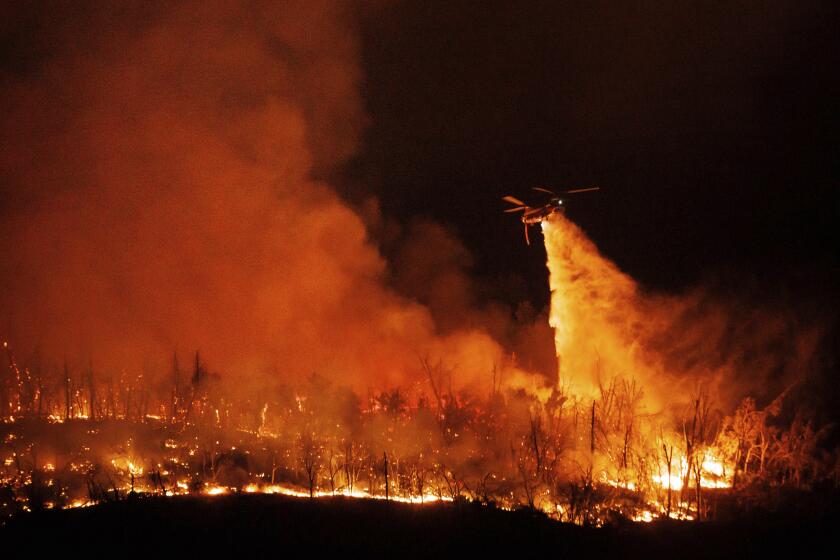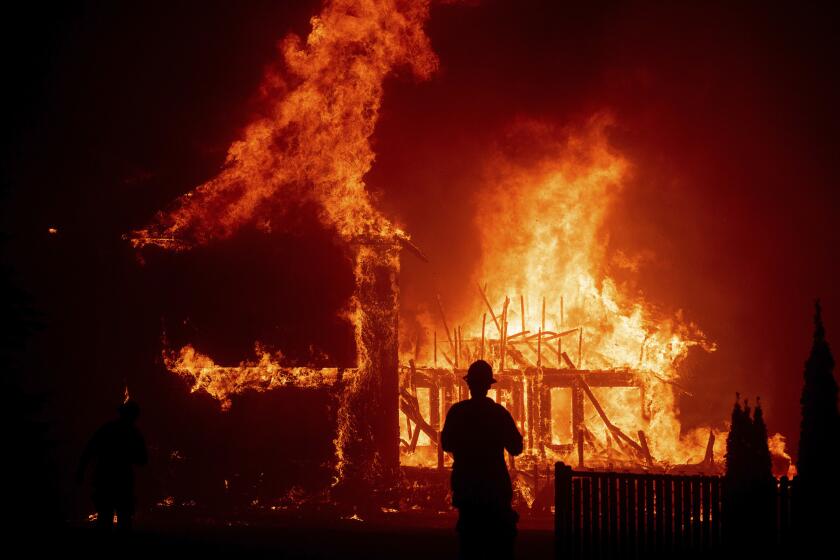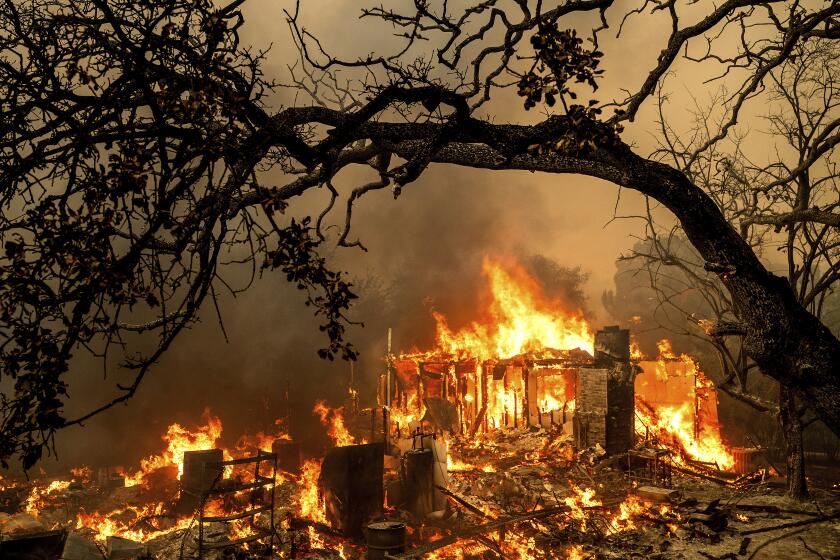Thousands evacuate, some stay as Thompson fire spreads in Northern California
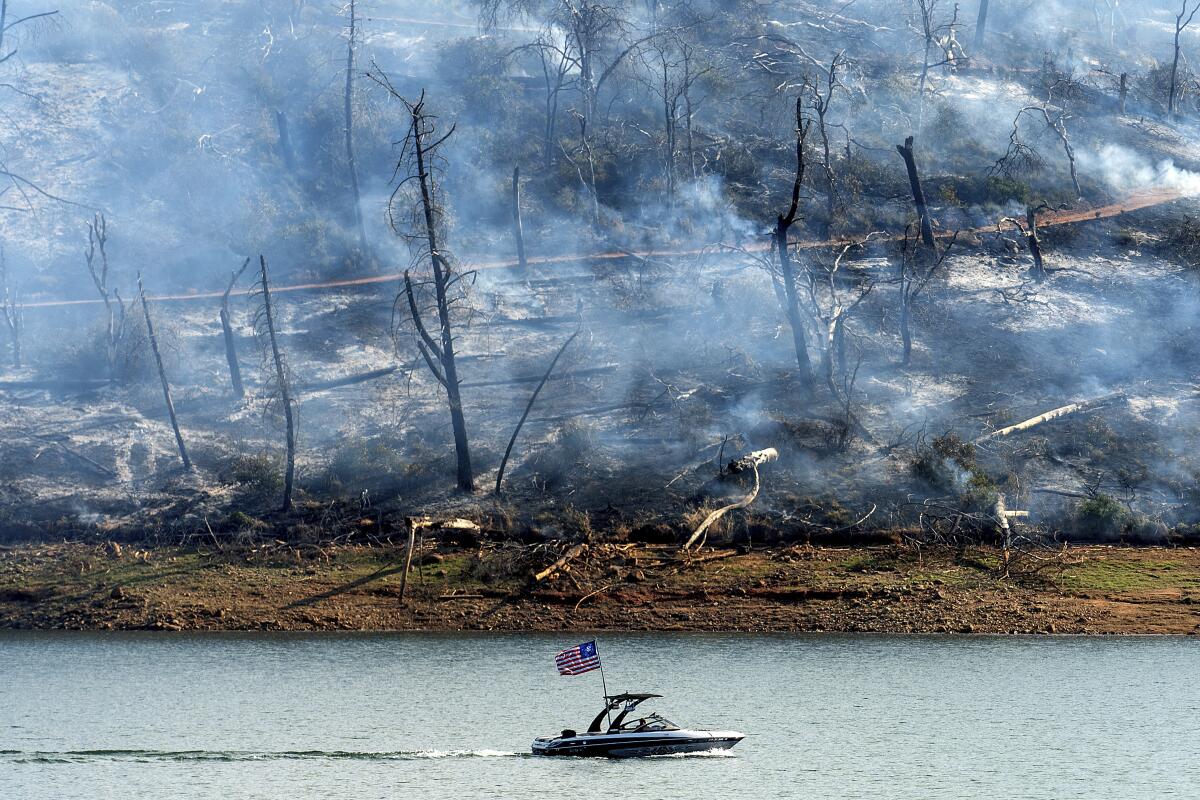
- Share via
OROVILLE, Calif. — When authorities ordered Brian Wong and his neighbors to evacuate as the Thompson fire bore down on the city of Oroville this week, the restaurant owner knew he couldn’t leave.
He had learned from the 2018 Camp fire how things can go wrong for people who can’t defend their property, he said.
Oroville is about 20 miles south of Paradise, where the deadliest wildfire in California history killed 85 people and destroyed the Butte County town.
“In the past I wouldn’t hesitate to leave, but I’m hearing a lot of stories about fire victims that were not taken care of in Paradise,” the 53-year-old said. “I’m afraid of leaving my house, leaving my property, and next thing it burns and we get into a complicated mess.
“I’m choosing to stay behind and defend my property if I need to,” he added.
High temperatures and dried vegetation are creating difficult conditions for firefighters across California. The Thompson fire is in Butte County.
As of Wednesday, more than 28,000 Butte County residents were under evacuation orders. The Thompson fire had grown to more than 3,500 acres with 0% containment. Four homes had been destroyed and thousands of structures were under threat, according to Rick Carhart, a public information officer with Cal Fire’s Butte County station.
Carhart said a number of evacuees who lost their homes in the Camp fire were being forced to evacuate once more.
Crews battled the blaze — one of several that broke out across the state this week — under excessive heat and red flag warnings. Temperatures were forecast to reach 108 degrees Wednesday, with wind gusts 15 to 20 mph.
Much of Northern California remains under a red flag warning, an alert for extreme fire weather. A combination of winds up to 30 mph, low humidity and hot temperatures “can contribute to extreme fire behavior,” according to the National Weather Service.
Eight new fires ignited across the state on Tuesday and nine on Wednesday, according to the California Department of Forestry and Fire Protection. The Thompson fire was the largest, followed by the Airline fire in San Benito County, which was 1,200 acres and 55% contained Wednesday morning.
Gov. Gavin Newsom on Wednesday declared a state of emergency for the Thompson fire, which he said was threatening “structures, homes, critical infrastructure, and health and congregate care facilities.”
The fire broke out just before 11 a.m. Tuesday and is under investigation, with no cause yet determined.
California fire: What started as a tiny brush fire became the state’s deadliest wildfire. Here’s how
Before there was a spark, there was the wind.
“The conditions out there that are in our county this summer are much different than we’ve experienced the last two summers,” Garrett Sjolund, Cal Fire unit chief in Butte County, said at a news conference Tuesday evening. “The fuels are very dense, the brush is dry, and, as you can see, any wind will move a fire out very quickly.”
Butte County Sheriff Kory L. Honea said during the news conference that there have been four fires within the last couple of weeks, calling this “a bad fire season.”
“I understand that people stay,” Honea said. “If you stay, you need to make sure that you’re paying attention to where the fire is going so that you can get out if necessary.”
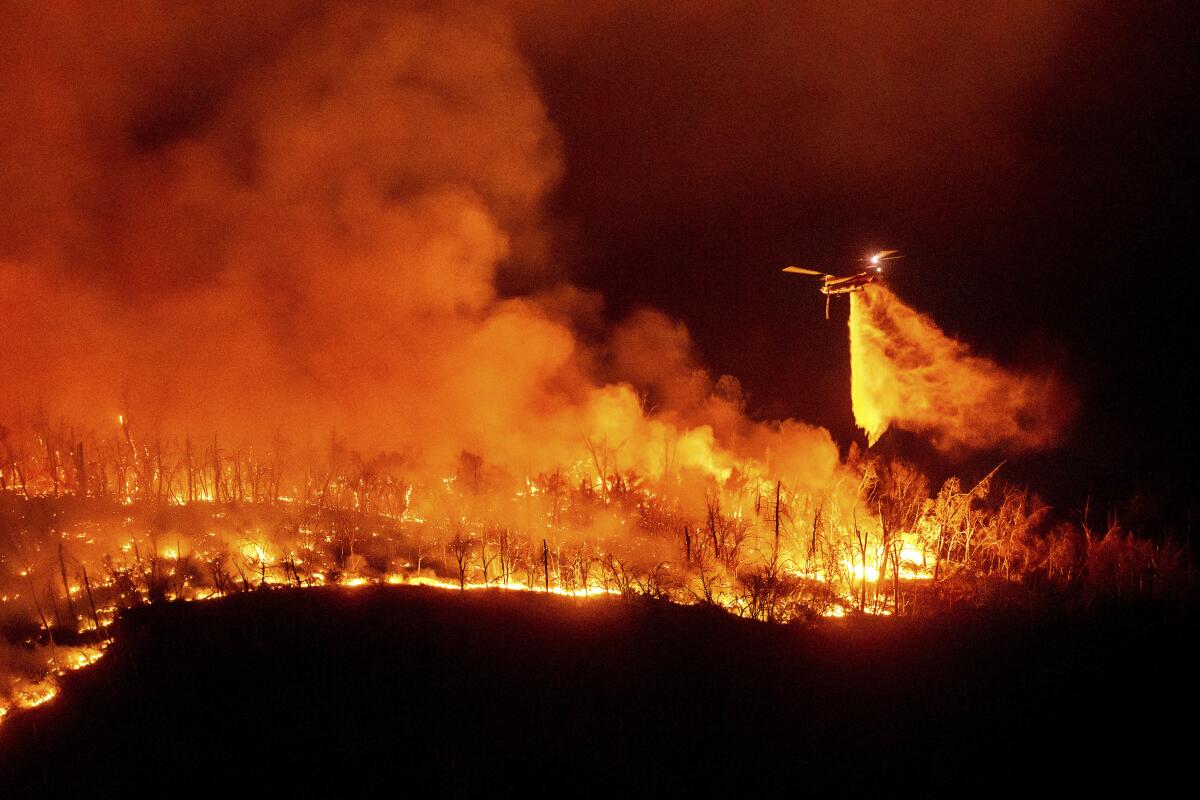
The sky was blue in many areas of Oroville on Wednesday, with a limited smell of smoke downtown. Businesses largely remained open, including the Wagon Wheel Market, located along Olive Highway.
Patrick Butler, 56, who runs the market with his brother Tom, said residents have “been through this numerous times.” He used a hose to wet down the store, he said, although there were no visible flames in the area Wednesday morning.
Outside, the air was a little smoky, and the roads were blocked east and west.
“I would imagine we’re under mandatory evacuation, if had to guess,” he said in a brief phone interview. “We have a ton of defensible space. We have a generator, a ton of water here. We will just be here taking care of business.”
The market has been in the Butler family since 1981. Most of those working Wednesday were immediate family members, including his brother, wife, daughter, son-in-law and grandkids, because his employees couldn’t make it through the roadblocks.
As California braces for a heat wave expected to last through next week, several wildfires have ignited under critical fire conditions, forcing evacuations.
That morning, they’d sold more sandwich makings than usual, along with breakfast burritos and water bottles.
“There’s a lot of people within this evacuation zone that we’re open to serve,” he said. “We’ve got a lot of first responders running around who need things.”
Members of the Oroville Chamber of Commerce spent Wednesday morning contacting vendors to let them know that the Fourth of July fireworks celebration had been canceled.
“That’s just been kind of a hometown tradition in our community. But with, obviously, the fire burning right into the city limits, everyone’s just focused on addressing the safety emergency situation,” said Eric Smith, president of the Oroville Chamber of Commerce. “It just wouldn’t be responsible at this point.”
Don and Linda Pederson were determined Wednesday not to be pushed around by the latest fire to encroach on their property.
“It’s not the first time this has happened,” said Don, 81.
But it is the closest a fire has come to their home of 50 years, which sits near Oroville Dam on an acre lot that has been in Linda’s family since 1945. Don said he thinks the fire, at its closest, was about a mile away. But he said they don’t plan to evacuate unless it crosses Highway 162, which serves as something of a firebreak.
The Pedersons’ home is in an evacuation warning area, although he said the fire map puts his garage squarely in the mandatory evacuation zone.
“Even if our whole house was in the evacuation zone, we would not leave unless I knew it was on our side of the road and coming down the hill,” he said, adding that they have power and, as a backup, a whole-house generator.
The day before, he said, “I could actually see flames in the distance.”
He said he is monitoring the fire with Linda, 79, from inside their home, with a few essential papers set aside in case they need to leave quickly. Their lot has been mowed to create a defensive space and protect against traveling embers. Their two vehicles are parked away from the house in case it caught fire. There are two fire hydrants next to their property.
“The breeze is not real strong, but it is picking up right now,” he said. “And I have seen quite a bit of smoke.”
He added that first responders have been working diligently since the fire broke out.
“Everybody really turned out for this,” he said.
Mike Shorrock, a retired Cal Fire battalion chief in Butte County, has been closely monitoring the flames from his home east of Oroville, just a couple of miles south of the blaze. He speaks in fire language, talking about containment lines, drainage and fire conditions as he feels the familiar tug to return to the job he held for 45 years.
Shorrock’s home is in a mandatory evacuation area, but — at least for now — he said he’s staying put.
“You get sort of in denial when you work in the business, like, ‘Oh, that won’t happen to me,’ but I have lots of friends who lost houses in the Paradise fire,” he said. “I feel comfortable staying because of my experience and sheltering in place to stay and defend. That’s a personal choice everybody has to make.”
More to Read
Sign up for Essential California
The most important California stories and recommendations in your inbox every morning.
You may occasionally receive promotional content from the Los Angeles Times.
